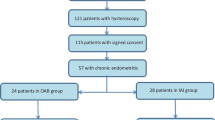Abstract
In the present study, we tried to determine whether IUD insertion related PID and febrile complications could, be prevented by prophylactic use of antibiotics. We studied 300 patients who were admitted to our family planning clinic for IUD contraception. Of these, 150 patients received prophylactic Doxycycline (group 1) and the second 150 received no therapy (group 2). Five cases experienced fever with or without leucocytosis and none required hospitalization. PID was observed in one woman in each group.
Positive culture (gonorrhea) was obtained in one woman who was then treated by relevant, antibiotics; the other woman required hospitalization for two days. The overall infection rates for group 1 and 2 were 2.1% and 2.9%, respectively and this difference was not significant. The incidence of PID infection and febrile complications was found to be very low for both groups when compared to other studies, suggesting that aseptic conditions with proper insertion reduce the risk of infection.
Resumé
Dans la présente étude, nous avons tenté de déterminer si l'inflammation pelvienne et les complications fébriles liées à l'insertion de DIU pouvaient être évitées par une administration prophylactique d'antibiotiques. Nous avons suivi 300 patientes de notre clinique de planning familial, admises pour l'insertion, de DIU. Un traitement prophylactique de doxycycline a été administré à 150 de ces patientes (Groupe 1) et les autres n'ont reçu aucune, thérapie (Groupe 2). Nous avons eu cinq cas de fièvre avec ou sans leucocytose mais aucune de ces femmes n'a dψ être hospitalisée. L'inflammation pelvienne s'est manifestée dans deux cas, un dans chaque groupe. Une culture positive (gonorrhée) a été obtenue chez une de ces patientes, à laquelle un traitement aux antibiotiques appropriés a été administré, et la seconde a dψ être hospitalisée pendant deux jours. Les taux globaux d'infection ont été, respectivement pour le groupe 1 et le groupe 2, de 2,1% et 2,9%, ce qui ne représente pas une différence significative. Une comparaison avec d'autres études a permis, de constater que l'incidence d'infection pelvienne inflammatoire et de complications fébriles était très faible dans les deux groupes, ce qui laisse penser que les conditions d'asepsie et une insertion correcte réduisent le risque d'infection.
Resumen
En el presente estudio, intentamos determinar si la inflamación pélvica y las complicationes febriles relacionadas con la inserción, de DIU podían evitarse mediante la administración profiláctica de antibióticos. Estudiamos a 300 pacientes de nuestra clínica de planificación familiar que recibieron DIU. Se administró un tratamiento profiláctico de doxicilina a 150 pacientes (Grupo 1) mientras que las restantes no recibieron ningún tratamiento (Grupo 2). Hubo cinco casos de fiebre con o sin leucocitosis pero ninguno requirió hospitalización. La inflamación pélvica se observó en dos casos, uno de cada grupo. Se obtuvo un cultivo positivo (gonorrea) en uno de los casos, que fue tratado con antibióticos apropiados, y el segundo caso debió ser hospitalizado durante dos días. Las tasas generales de infección fueron para el Grupo 1 y el Grupo 2, respectivamente, del 2,1% y del 2,9%, diferencia que no es significativa. Una comparación con otros estudios permitió verificar que la incidencia de infección pélvica inflamatoria y complicaciones febriles era muy baja en los dos grupos, lo cual hace pensar que las condiciones de asepsia y la inserción correcta reducen el riesgo de infección.
Similar content being viewed by others
References
Mishell DR Jr, Bell JH, Good RG, Moyer DL. The intrauterine device: a bacteriologic study of the endometrial cavity. Am J Obstet Gynecol. 1966;96:119–26.
Jovanovic R, Barone C, VanNatta FC, Cundema E. Preventing infection related to insertion of an intrauterine device. J Reprod Med. 1988;33:347–52.
Sinei SKA, Schulz KF, Lamptey PR, Grimes DA, Mati JKG, Rosenthal SM, Rosenberg MJ, Riara G, Njage PN, Bhullar VB, Ogembo HV. Preventing IUCD related, pelvic infection: the efficacy of prophylactic Doxycycline at insertion. Br J Obstet Gynecol. 1990;97:412–19.
Grimes DA, Schulz KF, Cates W. Prophylactic antibiotic for curettage abortion. Am J Obstet Gynecol. 1984;150:689–94.
WHO Task Force on Intrauterine Devices for Fertility Regulation. IUD insertion following termination of pregnancy: A clinical trial of the TCu 220C, Lippes Loop D and Copper 7. Stud Famm Plann. 1983;14:99–108.
Burkman RT. Association between intrauterine devices and pelvic inflammatory disease. Obstet Gynecol. 1981;57:269–76.
Kessel E. Pelvic inflammatory disease with intrauterine device use: A reassessment. Fertil Steril. 1989;51:1–11.
Edelman DA, Porter CW Jr. Pelvic inflammatory disease and the IUD. Adv. Contracept. 1986;2:313–25.
Lalipo OA, Farr G, Otolorin E, Konje JC, Sturgen K, Cox P, Champion CB. Prevention of, IUD-related pelvic infection: The efficacy of prophylactic doxycycline at IUD insertion. Adv Contracept. 1991;7:43–54.
Brewer C, Preventing of infection after abortion with a single dose of oral Doxycycline. Br Med J. 1980;281:780–81.
London RS, London ED, Siegelbaum M, Goldstein P. Use of Doxycycline in elective first trimester abortion. South Med. J. 1978;71:672–3.
Author information
Authors and Affiliations
Rights and permissions
About this article
Cite this article
Zorlu, C.G., Aral, K., Cobanoglu, O. et al. Pelvic inflammatory disease and intrauterine devices: Prophylactic antibiotics to reduce febrile complications. Adv Contracept 9, 299–302 (1993). https://doi.org/10.1007/BF01983207
Received:
Accepted:
Issue Date:
DOI: https://doi.org/10.1007/BF01983207




